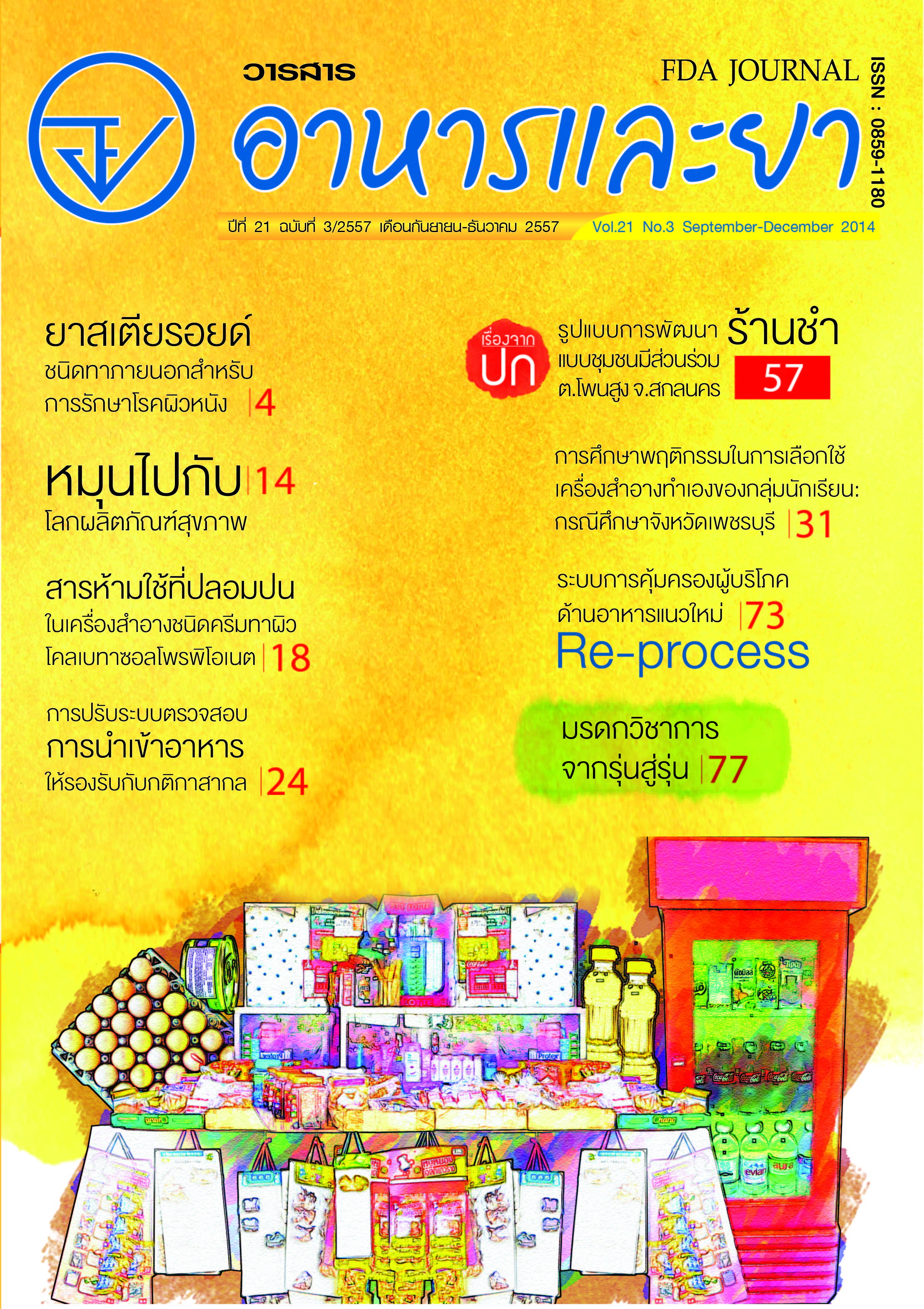การพัฒนาเอกสารกำกับยาสำหรับบุคลากรทางการแพทย์และการทดสอบการนำไปใช้ : กรณีศึกษายาแอสไพรินและยานาพรอกเซน
Main Article Content
บทคัดย่อ
ประเทศไทยจะก้าวเข้าสู่ประชาคมเศรษฐกิจอาเซียนใน พ.ศ.2558 จึงต้องเข้าร่วมในคณะท
ําางาน
ด้านผลิตภัณฑ์ยาของอาเซียน ซึ่งรวมถึงการพัฒนาหลักเกณฑ์และแนวทางการจัดท
ําาเอกสารก
ําากับยาตามประกาศ
สําานักงานคณะกรรมการอาหารและยา ลงวันที่ 3 กรกฎาคม พ.ศ.2556 การวิจัยนี้จึงมีวัตถุประสงค์เพื่อพัฒนา
ต้นแบบเอกสารก
ําากับยาส
ําาหรับบุคลากรทางการแพทย์ตามประกาศดังกล่าว ของยา 4 รายการ คือ แอสไพริน
(ยาควบคุมพิเศษ) แอสไพริน (ยาอันตราย) นาพรอกเซน และนาพรอกเซนโซเดียม โดยใช้ข้อมูลจากเอกสาร
อ้างอิงหลักจ
ําานวน 7 แหล่ง ท
ําาการสืบค้นระหว่างเดือนตุลาคม 2556 – มกราคม 2557 หลังจากนั้น
นําามาตรวจสอบความถูกต้องและหาค่าดัชนีความสอดคล้องของข้อมูลในเอกสารก
ําากับยาแต่ละฉบับ จากผู้เชี่ยวชาญ
3 คน จนได้เนื้อหาหลักประกอบด้วย 10 หัวข้อใหญ่ โดยเฉลี่ยเนื้อหาของเอกสารก
ําากับยามีจ
ําานวน
20 หน้า แล้วน
ําาเอกสารก
ําากับยานั้นไปทดสอบการน
ําาไปใช้ เพื่อให้เกิดความมั่นใจว่า เอกสารก
ําากับยานั้นสามารถ
ทําาให้ผู้ใช้เข้าใจและได้รับข้อมูลที่เป็นประโยชน์ โดยกลุ่มตัวอย่างที่ถูกสุ่มแบบเฉพาะเจาะจงเป็นแพทย์
ทันตแพทย์ เภสัชกร นักเทคนิคการแพทย์ พยาบาล และนักวิชาการสาธารณสุข จําานวนสาขาละ 2 คนต่อ
การทดสอบเอกสารก
ําากับยาต่อรอบต่อฉบับ ซึ่งกลุ่มตัวอย่างจะต้องค้นหาค
ําาตอบและตอบค
ําาถามด้วยภาษา
ของตนเองอย่างถูกต้องแยกตามรายข้อ จากคําาถาม 14 ข้อ 3 ประเภท คือ ข้อมูลทั่วไปของยา การปฏิบัติตัว
ในการใช้ยา และความเข้าใจของเหตุผลในการปฏิบัติตัวต่างๆ ในขณะที่ใช้ยา แล้วทดสอบซํา้าในกลุ่มตัวอย่าง
จําานวนเท่าเดิมกลุ่มใหม่อีก 1 รอบ รวมกลุ่มตัวอย่างทั้งสิ้น 96 คน ผลการทดสอบพบว่า มีเพียงเอกสารกําากับ
ยาแอสไพรินชนิดยาควบคุมพิเศษที่ผ่านการทดสอบ ซึ่งเอกสารฉบับที่ไม่ผ่านเกณฑ์ เกิดจาก 2 ด้าน คือ
ด้านรูปแบบแสดงต
ําาแหน่งของค
ําาตอบไม่โดดเด่น ยากต่อการสังเกต และด้านเนื้อหาที่ค
ําาถามไม่ชัดเจน
ทําาให้ผู้ถูกทดสอบเกิดความสับสน ส่วนข้อเสนอแนะเพิ่มเติมด้านการพัฒนาเอกสารก
ําากับยาส
ําาหรับบุคลากร
ทางการแพทย์ เสนอให้มีจัดท
ําาในรูปแบบเอกสารออนไลน์แทนกระดาษ เพื่อให้เข้าถึงข้อมูลอย่างสะดวก รวดเร็ว
และประหยัดงบประมาณด้วย
ําางาน
ด้านผลิตภัณฑ์ยาของอาเซียน ซึ่งรวมถึงการพัฒนาหลักเกณฑ์และแนวทางการจัดท
ําาเอกสารก
ําากับยาตามประกาศ
สําานักงานคณะกรรมการอาหารและยา ลงวันที่ 3 กรกฎาคม พ.ศ.2556 การวิจัยนี้จึงมีวัตถุประสงค์เพื่อพัฒนา
ต้นแบบเอกสารก
ําากับยาส
ําาหรับบุคลากรทางการแพทย์ตามประกาศดังกล่าว ของยา 4 รายการ คือ แอสไพริน
(ยาควบคุมพิเศษ) แอสไพริน (ยาอันตราย) นาพรอกเซน และนาพรอกเซนโซเดียม โดยใช้ข้อมูลจากเอกสาร
อ้างอิงหลักจ
ําานวน 7 แหล่ง ท
ําาการสืบค้นระหว่างเดือนตุลาคม 2556 – มกราคม 2557 หลังจากนั้น
นําามาตรวจสอบความถูกต้องและหาค่าดัชนีความสอดคล้องของข้อมูลในเอกสารก
ําากับยาแต่ละฉบับ จากผู้เชี่ยวชาญ
3 คน จนได้เนื้อหาหลักประกอบด้วย 10 หัวข้อใหญ่ โดยเฉลี่ยเนื้อหาของเอกสารก
ําากับยามีจ
ําานวน
20 หน้า แล้วน
ําาเอกสารก
ําากับยานั้นไปทดสอบการน
ําาไปใช้ เพื่อให้เกิดความมั่นใจว่า เอกสารก
ําากับยานั้นสามารถ
ทําาให้ผู้ใช้เข้าใจและได้รับข้อมูลที่เป็นประโยชน์ โดยกลุ่มตัวอย่างที่ถูกสุ่มแบบเฉพาะเจาะจงเป็นแพทย์
ทันตแพทย์ เภสัชกร นักเทคนิคการแพทย์ พยาบาล และนักวิชาการสาธารณสุข จําานวนสาขาละ 2 คนต่อ
การทดสอบเอกสารก
ําากับยาต่อรอบต่อฉบับ ซึ่งกลุ่มตัวอย่างจะต้องค้นหาค
ําาตอบและตอบค
ําาถามด้วยภาษา
ของตนเองอย่างถูกต้องแยกตามรายข้อ จากคําาถาม 14 ข้อ 3 ประเภท คือ ข้อมูลทั่วไปของยา การปฏิบัติตัว
ในการใช้ยา และความเข้าใจของเหตุผลในการปฏิบัติตัวต่างๆ ในขณะที่ใช้ยา แล้วทดสอบซํา้าในกลุ่มตัวอย่าง
จําานวนเท่าเดิมกลุ่มใหม่อีก 1 รอบ รวมกลุ่มตัวอย่างทั้งสิ้น 96 คน ผลการทดสอบพบว่า มีเพียงเอกสารกําากับ
ยาแอสไพรินชนิดยาควบคุมพิเศษที่ผ่านการทดสอบ ซึ่งเอกสารฉบับที่ไม่ผ่านเกณฑ์ เกิดจาก 2 ด้าน คือ
ด้านรูปแบบแสดงต
ําาแหน่งของค
ําาตอบไม่โดดเด่น ยากต่อการสังเกต และด้านเนื้อหาที่ค
ําาถามไม่ชัดเจน
ทําาให้ผู้ถูกทดสอบเกิดความสับสน ส่วนข้อเสนอแนะเพิ่มเติมด้านการพัฒนาเอกสารก
ําากับยาส
ําาหรับบุคลากร
ทางการแพทย์ เสนอให้มีจัดท
ําาในรูปแบบเอกสารออนไลน์แทนกระดาษ เพื่อให้เข้าถึงข้อมูลอย่างสะดวก รวดเร็ว
และประหยัดงบประมาณด้วย
Article Details
รูปแบบการอ้างอิง
1.
อ่อนดี ว, กิติกรรณากรณ์ น. การพัฒนาเอกสารกำกับยาสำหรับบุคลากรทางการแพทย์และการทดสอบการนำไปใช้ : กรณีศึกษายาแอสไพรินและยานาพรอกเซน. TFDJ [อินเทอร์เน็ต]. 8 สิงหาคม 2018 [อ้างถึง 14 กุมภาพันธ์ 2026];21(3):39-46. available at: https://he01.tci-thaijo.org/index.php/fdajournal/article/view/139052
ประเภทบทความ
รายงานการวิจัย


